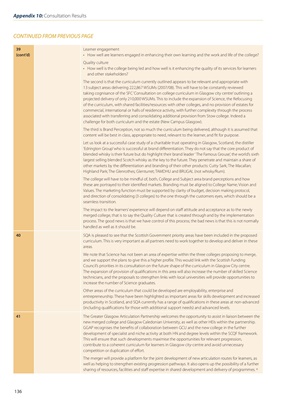
39
(cont'd)
Learner engagement
How well are learners engaged in enhancing their own learning and the work and life of the college?
Quality culture
How well is the college being led and how well is it enhancing the quality of its services for learners
and other stakeholders?
The second is that the curriculum currently outlined appears to be relevant and appropriate with
13 subject areas delivering 222,867 WSUMs (2007/08). This will have to be constantly reviewed
taking cognisance of the SFC 'Consultation on college curriculum in Glasgow city centre' outlining a
projected delivery of only 210,000 WSUMs. This to include the expansion of Science, the Refocusing
of the curriculum, with shared facilities/resources with other colleges, and no provision of estates for
commercial, international or halls of residence activity, with further complexity through the process
associated with transferring and consolidating additional provision from Stow college. Indeed a
challenge for both curriculum and the estate (New Campus Glasgow).
The third is Brand Perception, not so much the curriculum being delivered, although it is assumed that
content will be best in class, appropriate to need, relevant to the learner, and i t for purpose.
Let us look at a successful case study of a charitable trust operating in Glasgow, Scotland, the distiller
'Edrington Group' who is successful at brand dif erentiation. They do not say that the core product of
blended whisky is their future but do highlight their brand leader ' The Famous Grouse', the world's sixth
largest selling blended Scotch whisky as the key to the future. They penetrate and maintain a share of
other markets by the dif erentiation and branding of their other products: Cutty Sark; The Macallan;
Highland Park; The Glenrothes; Glenturret; TAMDHU and BRUGAL (not whisky/Rum).
The college will have to be mindful of, both, College and Subject area brand perceptions and how
these are portrayed to their identii ed markets. Branding must be aligned to College Name; Vision and
Values. The marketing function must be supported by clarity of budget, decision making protocol,
and direction of consolidating (3 colleges) to the one through the customers eyes, which should be a
seamless transition.
The impact to the learners' experience will depend on staf attitude and acceptance as to the newly
merged college, that is to say the Quality Culture that is created through and by the implementation
process. The good news is that we have control of this process; the bad news is that this is not normally
handled as well as it should be.
•
•
40 SQA is pleased to see that the Scottish Government priority areas have been included in the proposed
curriculum. This is very important as all partners need to work together to develop and deliver in these
areas.
We note that Science has not been an area of expertise within the three colleges proposing to merge,
and we support the plans to give this a higher proi le. This would link with the Scottish Funding
Council's priorities in its consultation on the future shape of the curriculum in Glasgow City centre.
The expansion of provision of qualii cations in this area will also increase the number of skilled Science
technicians, and the proposals to strengthen links with local universities will provide opportunities to
increase the number of Science graduates.
Other areas of the curriculum that could be developed are employability, enterprise and
entrepreneurship. These have been highlighted as important areas for skills development and increased
productivity in Scotland, and SQA currently has a range of qualii cations in these areas at non-advanced
(including qualii cations for those with additional support needs) and advanced levels.
41 The Greater Glasgow Articulation Partnership welcomes the opportunity to assist in liaison between the
new merged college and Glasgow Caledonian University, as well as other HEIs within the partnership.
GGAP recognises the benei ts of collaboration between GCU and the new college in the further
development of specialist and niche activity at both HN and degree levels within the SCQF framework.
This will ensure that such developments maximise the opportunities for relevant progression,
contribute to a coherent curriculum for learners in Glasgow city-centre and avoid unnecessary
competition or duplication of ef ort.
The merger will provide a platform for the joint development of new articulation routes for learners, as
well as helping to strengthen existing progression pathways. It also opens up the possibility of a further
sharing of resources, facilities and staf expertise in shared development and delivery of programmes. º
CONTINUED FROM PREVIOUS PAGE
136
Appendix 10: Consultation Results